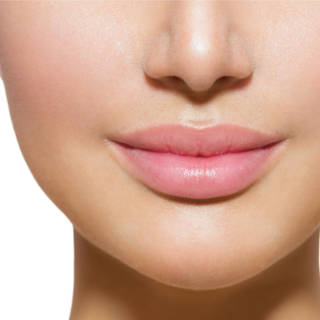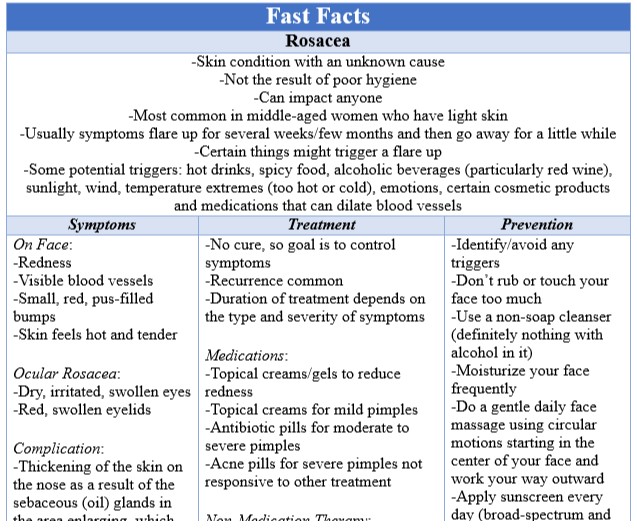Why is your face red?
You’ve probably seen people who have a red face and, sometimes, small red bumps, but never really thought much about it until you notice that your face has these symptoms. Why did this happen? What caused it to occur? Are there steps you can take to prevent it in the future?
 Definition
Definition
Rosacea is a skin condition with an unknown cause, but definitely isn’t the result of poor hygiene. It can impact anyone, but it’s most common in middle-aged women who have light skin. Usually symptoms flare up for several weeks to a few months and then go away for a period of time. It’s thought that certain things might trigger a flare up. Some of these potential triggers include hot drinks, spicy food, alcoholic beverages (particularly red wine), sunlight, wind, temperature extremes (too hot or cold), emotions, exercise, certain cosmetic products and medications that can dilate blood vessels.
The most common symptoms of rosacea are redness and visible blood vessels on the central part of your face. For some individuals, it can cause small, red, pus-filled bumps, which make your skin feel hot and tender. This means that it’s often mistaken for acne or other skin problems. For others, they also have dry, irritated, swollen eyes and red, swollen eyelids. This is known as ocular rosacea. A slow developing complication that occurs more often in men than women is the thickening of the skin on the nose as a result of the sebaceous (oil) glands in the area enlarging, which makes the nose appear bulbous. Some risk factors for developing rosacea, besides being female and light skinned, are being over the age of 30, smoking, sun exposure and having a family history of rosacea.
Treatment
Unfortunately, there isn’t a cure for rosacea yet, so the focus of treatment is to control symptoms. Recurrence is common, so the duration of treatment depends on the type and severity of your symptoms. One of the main forms of treatment is medication. The most common are topical creams/gels that help to reduce redness by constricting the blood vessels. Typically, results are seen within 12 hours, but the cream needs to be applied regularly since the effect is temporary. There are other creams that are designed to control mild pimples. It’s important to note that any improvements don’t appear for 2-6 weeks. If your pimples are moderate to severe, your doctor might prescribe antibiotics pills to help. In some severe cases, when no other medications are working, your doctor will recommend acne pills to clear up the bumps. These medications can’t be taken while pregnant though. Some non-medication treatment includes use laser therapy or light-based therapy to reduce the redness of enlarged blood vessels. Often repeated treatments are needed occasionally in order to maintain your skin’s improved appearance. There are some things that you can do at home to help control the symptoms; however, they are the same as prevention techniques, so please see the next section.
Prevention
The most important thing that you can do to prevent a rosacea flare up is to identify any triggers that you have and do your best to avoid them whenever possible. The next best thing is to be nice to your skin. This means not rubbing or touching it too much, using a non-soap cleanser (definitely make sure that the products don’t contain alcohol) and moisturize your face frequently. Some people find a gentle daily face massage to be helpful in decrease swelling and inflammation. The idea is to use circular motions starting in the center of your face and working your way to your ears. It’s also key to apply sunscreen every day. It should be broad-spectrum and at least an SPF of 30. If you’re self-conscious about your face redness, some makeups can help. The best ones are powders with a green tone and matte finish. Just be sure that the makeup doesn’t irritate your skin. If you feel embarrassed or anxious about your rosacea to the point that you become self-conscious or withdrawn, then talking to a counselor might be beneficial.
Rosacea can be a distressing skin condition, but there are ways to manage it. If you have any questions or concerns about rosacea, please speak with your doctor. If you would like more information, please visit the National Rosacea Society at https://www.rosacea.org/